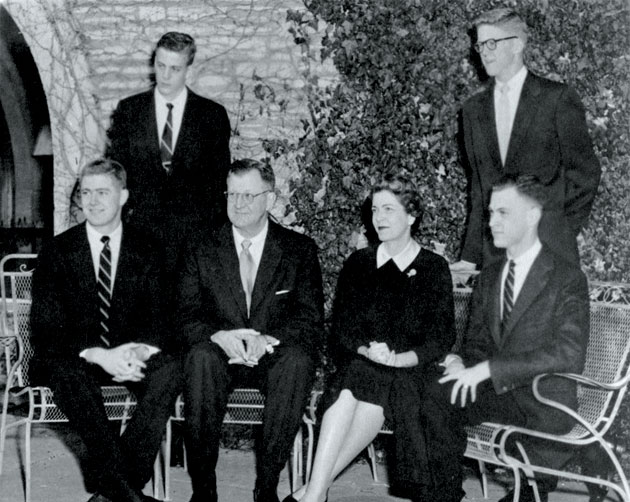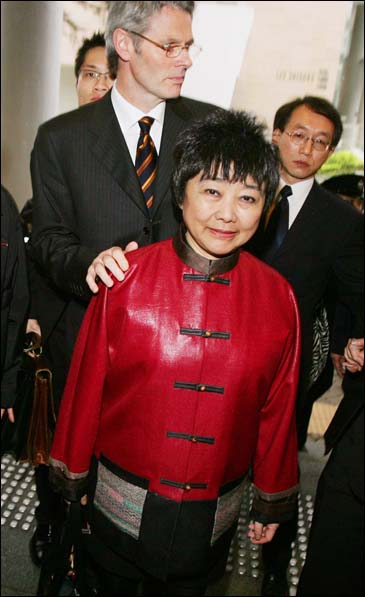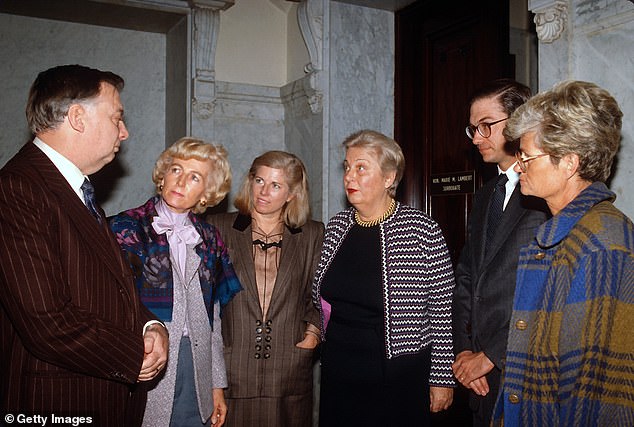Discussions about money will always remain a point of contention. While some believe that it can lead to happiness, others maintain the opposite. The truth lies somewhere in between, with the impact of money varying depending on its acquisition.
Wealth can be attained through professional success, hard work, or luck. Alternatively, some individuals possess the privilege of being born into wealth and merely have to wait for their inheritance. While it may seem like an ideal situation, the inheritance process can be incredibly complicated, leading to disputes amongst heirs. These conflicts can last for years or even decades and often result in legal battles where funds dwindle due to mounting legal fees.
Families may become torn apart as anger among surviving members intensifies. This list covers ten of the most vicious and vindictive fights over inherited fortunes, where billions of dollars are at stake. However, in the end, one must question whether anyone truly emerges victorious from these disputes.
10. J. Howard Marshall

Of course, we can’t forget the most notorious case of an inheritance gone awry. Anna Nicole Smith, a well-known model and dancer, met billionaire J. Howard Marshall in a gentlemen’s club in 1991, and the two married three years later. Marshall’s family immediately questioned the marriage’s validity, given the 63-year age difference between the couple.
Unfortunately, Marshall passed away just one year after their marriage, igniting a bizarre and vicious legal battle over his estate. The issue that emerged immediately was that Marshall had omitted Anna from his will. He also left nothing to his son Howard, bequeathing his money exclusively to his other son, Pierce.
The stage was set for a contentious courtroom clash between Anna and Pierce. The high-profile case was rife with twists and turns, with Pierce claiming that 13 legal documents proved he was the rightful heir. Conversely, Anna contended that her late husband had promised to provide her with half of his estate while he was alive. The case captivated the media for years and resulted in conflicting rulings from a Texas state court and a California bankruptcy court. The Supreme Court even weighed in, determining that Anna could continue battling for the inheritance.
Sadly, both Anna and Pierce passed away in quick succession in the mid-2000s. However, the fight over Marshall’s fortune persisted, with Smith’s daughter emerging as the potential heir. By the mid-2010s, courts had ruled against Smith’s estate in favor of Marshall’s family.
In 2017, the judge who had presided over the probate case requested that the parties not appear in court anymore. This request from the judge served as an indication that the case had dragged on for far too long.
9. Fred Koch

During the mid-20th century, Fred Koch was an influential oil tycoon in the United States. His company, Koch Industries, was run by his four sons. Before his death in 1967, Fred implored his sons to treat each other with kindness, but unfortunately, his wishes were not respected.
Upon his passing, his sons engaged in bitter power struggles and rivalries over control of the family business. This company was wealthy and profitable, so there was a lot at stake. In the end, Charles and David Koch bought out their brothers Bill and Frederick for a staggering amount of over $1 billion. It was a substantial sum, but Bill and Frederick felt that it wasn’t enough and took their brothers to court over the matter.
The legal battle went on for more than two decades, creating a rift between the siblings that lasted 18 years. Even during their mother’s funeral, the feud continued. To make matters worse, their mother had removed Bill and Frederick from her will due to the ongoing lawsuit.
The case finally ended in 1998, with Bill and Frederick losing their claim for more money. Ultimately, they had to accept the original settlement of $700 million and move on.
8. Nina Wang

Nina Wang was a wealthy individual with an intriguing personality. Though she was among the wealthiest people in the world around the early 2000s, she lived modestly and was often called “Little Sweetie” due to her demeanor. Despite being in her 60s, she dressed in miniskirts, ankle socks, and pigtails, which lent her a childlike impression.
Nina’s late husband, Teddy Wang, was an exceptionally affluent businessman, who was kidnapped twice before his death. The second incident resulted in his m*rder when the family wasn’t able to pay his ransom quickly enough. Following his death, a legal battle broke out over the fortune he left behind, and Nina was imprisoned on forgery counts related to this matter. Ultimately she received a significant stake in the inheritance.
Following Nina’s demise in 2006, another legal battle erupted over her $4 billion estate. Tony Chan, her married boyfriend, claimed to be the only legal beneficiary of her will. Nevertheless, her family contested the validity of the will, leading to a protracted courtroom tussle that fascinated crowds across Asia, eager for sordid details of their relationship.
The court eventually ruled that Nina’s will was fraudulent, and her true wishes were to donate her immense fortune to charity. Tony was then sentenced to twelve years in prison in 2012 for forging the will. Nina will always be remembered as the enigmatic and filthy-rich woman caught up in two bitter inheritance battles.
7. John Seward Johnson

John Seward Johnson was a familiar name owing to his connection with the Johnson & Johnson corporation. He enjoyed a long and happy marriage to his spouse, Essie, and seemed to have a charmed existence. However, everything changed when he developed feelings for a new 30-year-old employee, Basia Piasecka, a Polish immigrant. Despite the forty-year age gap and the controversial beginning, the two remained together until Seward’s death in 1983. This marked the start of a scandal for Seward’s children and his vast estate.
After his death, the magnate’s six children were astounded to learn that he had bequeathed almost his entire half-a-billion-dollar fortune to his former maid. They took her to court, alleging that Basia had manipulated Seward, taking advantage of his age and mental state. Nevertheless, Basia was adamant and fought back, claiming their marriage was a happy one. She accused the stepchildren of being fixated only on the inheritance.
The lawsuit lasted for four whole months, coming to trial in 1986. Just before the verdict was to be delivered, Basia had a change of heart and decided to settle. She walked away with more than $300 million, while the remaining funds were divided between the children and several charities.
6. William Jennens

The story of William Jennens, a wealthy Englishman who died in 1798, is one of the most fascinating and intricate inheritance battles in history. During his lifetime, he was widely known as England’s wealthiest commoner, with a fortune that exceeded two million pounds sterling.
However, his death resulted in an estate without a will, leaving behind a fortune that was open to contest. This led to a frenzy of people from around the world, all proclaiming to be related to Jennens, with the hope of claiming his riches.
Unfortunately, the confusion around Jennens’s own uncertain parentage only made things worse. It made the legal battle over his inheritance even more complicated, with the battle lasting for over a century. This legal mess is believed to have inspired Charles Dickens’s novel Bleak House.
In the end, the lawyers took most of the fortune, leaving little for those hoping to cash in. The case of William Jennens serves as a reminder that dying without a will can be costly. Even though he had accumulated an incredible amount of wealth during his lifetime, most of it was eaten up in attorney’s fees.
It’s a lesson to the wealthiest among us to create a will in the unfortunate event of their demise, to avoid experiencing the same fate.
5. Jay Pritzker

Jay Pritzker, the founder of numerous businesses including the renowned Hyatt hotel chain, achieved great wealth during his lifetime. However, following his death in 2001, his legacy began to unravel amidst public turmoil and legal battles.
Unlike many ultra-wealthy families, the Pritzkers were known for keeping a low profile but this changed when one of their young nieces, Liesel Pritzker, took legal action against her father and cousins for theft of approximately $1 billion from her and her brother’s trust fund, and for being excluded from a secret agreement to sell off the family’s businesses.
The lengthy court battle split the family and exposed their intimate affairs to the public eye. The situation soon caused discomfort amongst most of the extended family, particularly Jay Robert and Anthony Pritzker. Following two years of proceedings, the family finally reached a settlement which granted Liesel and her brother a sum of approximately $560 million to settle the dispute.
While not all members of the family agreed with the payment, it brought an end to the conflict and allowed some of the famously private Pritzkers to return to a relatively low-key existence, free from intrusive media attention.
4. Peter Thellusson

The story of Peter Thellusson serves as a lesson on the dangers of attempting to control massive wealth beyond one’s lifetime. Thellusson, a successful British merchant, amassed a considerable fortune during his time. In preparation for his eventual passing in 1797, he sought to ensure his wealth would continue to grow perpetually, without his descendants ever gaining access to it.
To accomplish this, Thellusson stipulated in his will that his estate be held in trust, with all interest that accrued over the years being added to the total sum. His intention was for the money to accumulate over time until his great-grandchildren were no more, leaving the wealth to whoever remained as an inheritance, several generations down the line.
However, Thellusson’s plan ended up backfiring. Shortly after his death, his surviving family found themselves in financial dire straits, with his wealth locked away in a trust as per his will. When all of his great-grandchildren eventually passed nearly sixty years later, a legal battle ensued in 1856 to determine who should inherit the fortune. But it turned out that his estate, after years of court fees and taxes, had barely accumulated any wealth at all. Thus, Thellusson’s grand plan to pass on riches to someone he never even met turned out to be a colossal failure.
The outcome of Thellusson’s will was so astonishing that it prompted a change in British law. Parliament responded by enacting the Thellusson Act in the 19th century to prevent individuals from withholding inheritable assets from their family in a similar capacity in the future.
3. Leona Helmsley

Leona Helmsley, known as “The Queen of Mean”, gained notoriety for her harsh treatment of others and frugality during her time as a socialite. She and her husband had great success in business and real estate, but in 1988 she was convicted of tax evasion and famously declared, “We don’t pay taxes. Only the little people pay taxes.” After serving time in prison, Helmsley became a dog lover and left her beloved pooch, Trouble, with a $12 million inheritance upon her passing in 2007.
Her estate was valued between $4 billion and $8 billion, with the majority of her wealth placed in a charitable trust. However, her will faced legal challenges with her disinherited grandchildren successfully suing for $3 million each and the executors winning $100 million for their services. Trouble’s inheritance was reduced to $2 million and animal welfare groups also waged their own legal battles for a larger portion of the charitable trust. Despite her tumultuous life, the “Queen of Mean” left a lasting legal legacy.
2. Harinder Singh Brar

The once-powerful royal families that reigned over various parts of the Indian subcontinent are no longer as dominant as they were in past centuries. Nonetheless, many of these families still retain significant inherited wealth. One such family was led by Sir Harinder Singh Brar, the last ruler of the Faridkot state. Throughout his life, Sir Harinder made multiple wills, each one revised numerous times, including one where he initially disinherited one of his daughters, Amrit Kaur, and then later reconciled with her.
However, after Sir Harinder’s death in 1989, a legal battle erupted when a different will, once again disinheriting Amrit, was read at the inquest, even though she believed she was aware of the most recent changes. The ensuing 31-year legal battle included Kaur, her two sisters, an uncle, and a cousin.
In 2022, the Indian Supreme Court finally settled the case, ruling that the final will was a forgery. Kaur had already staked her own claim to the original will’s assets, but now she filed a lawsuit against 23 people whom she suspected of being part of the forgery plot.
1. Sir Jacob Downing

The esteemed academic institution known as the University of Cambridge can be found in England. It boasts a world-renowned reputation and is comprised of 31 colleges, each serving as a student’s home base. These colleges provide students with not only a place to live but also a community where lifelong friendships can be formed. Generous endowments from wealthy individuals made the creation of these colleges possible.
England’s wealthiest citizens have been leaving their mark on the university for centuries, with some even donating generous sums to establish colleges. Their legacies live on today as benefactors of one of the greatest universities in the world. However, not all donations have gone smoothly. Some have led to complicated legal battles that have lasted for years.
Downing College is a prime example of this. It was founded through a 17th-century bequest from English statesman Sir George Downing but faced numerous challenges. In the late 18th century, Sir Jacob Downing was the last living heir of Sir George. He inherited a sizable fortune from the family which he left to his wife upon his death in 1764.
The University of Cambridge sought to challenge the will and claim money for George’s century-old donation. This sparked a vicious 40-year legal battle, which was finally won by the university. However, much of the money had been spent on legal fees, leaving little funds remaining to build a college. Despite this setback, the university persevered with what they had earned through the legal battle, and Downing College finally welcomed its first students in 1820.
